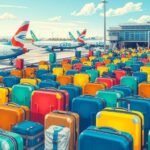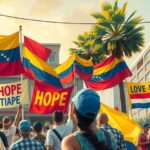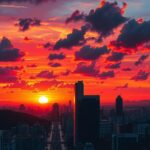Panic and Vulnerability in Venezuelan Migrant Communities Following Deportation Threats
The Venezuelan migrant community faces an escalating crisis following the end of humanitarian parole, leaving 1.2 million undocumented individuals vulnerable to deportation. Reports of targeting tattooed migrants have heightened panic, convincing many to withdraw from public life in fear of immigration enforcement. Activists highlight their plight and lack of political representation, emphasizing the urgent need for legal protection and support.
Panic pervades Venezuelan migrant communities in the United States following the ending of humanitarian parole, leaving approximately 1.2 million individuals without legal protection. Reports of deportations, particularly targeting tattooed Venezuelans suspected of gang affiliations, exacerbate this crisis. Migrants like Nassi voice their despair, grappling with the constant threat of arrest and the potential for forced deportation to unsafe conditions in their homeland or harsh prisons in El Salvador.
Nassi, a trained dancer from Maracaibo, Venezuela, migrated through Latin America seeking safety and legal status in the U.S. Unfortunately, the lapse of temporary protected status and humanitarian parole has rendered him undocumented. Residing in Nashville, he has curtailed his daily activities to avoid drawing attention from immigration agents. He expresses feelings of entrapment and fear, full of uncertainty regarding his future as legal protections dwindle, raising concerns about rapid deportation under restrictive laws like the Alien Enemies Act.
The situation is dire for many Venezuelans, as they face arrest without consular support due to severed diplomatic ties since 2019. Nassi articulates widespread sentiments among immigrants feeling targeted and persecuted. José Colina, a retired military officer and advocate, notes the panic pervasive within the Venezuelan community, emphasizing their unique legal vulnerabilities and the challenges they face in accessing critical legal resources.
In Florida, which hosts a significant Venezuelan population, communities have noticeably quieted. Activist Colina remarks that the streets once bustling with Venezuelans are now eerily silent as individuals withdraw into their homes amid escalated fears of deportation. The marketplace and social hubs, such as El Arepazo, which typically thrived with community engagement, now experience a downturn as residents grapple with a sense of defeat and uncertainty about their future.
Many Venezuelans feel misled by the political landscape, believing former President Trump would bolster their cause against the Maduro regime, only to find themselves victims of harsh immigration policies. As options to leave the U.S. diminish—compounded by the lack of Venezuelan consulates for passport issuance—their plight becomes increasingly desperate. Colina underscores their lack of representation and political power, leading to a perception of vulnerability that is being exploited in current immigration practices.
Concerns grow within the community regarding the U.S. government’s tenuous claims against deported individuals related to the Tren de Aragua gang. Journalist Ronna Rísquez highlights the absence of transparency and adequate evidence when labeling undocumented immigrants as gang members. She stresses that tattoos, often used as identifiers, do not firmly establish a connection to criminality, emphasizing the need for due process and proof.
Overall, the Venezuelan migrant community in the U.S. finds itself in a precarious situation characterized by fear, uncertainty, and a lack of legal avenues for protection and support.
The recurrent theme of panic echoes throughout the narratives of migrants who, once hopeful, now navigate a legal and humanitarian limbo with minimal support.
In summary, Venezuelan migrants are currently under severe distress due to the cessation of protections against deportation. Reports of deportations based on superficial identifiers like tattoos, combined with heightened immigration enforcement, have created a pervasive culture of fear. Activists underscore the unique vulnerabilities faced by this group due to political disenfranchisement and the lack of diplomatic support, leading to significant community disengagement and distress over uncertain futures. Calls for transparent legal processes and protections are crucial as the situation continues to evolve.
Original Source: english.elpais.com








Post Comment